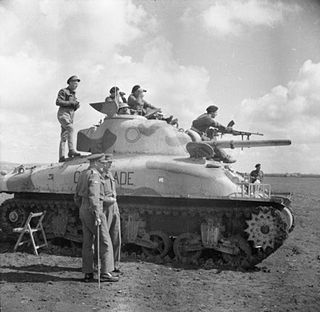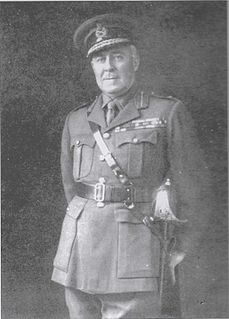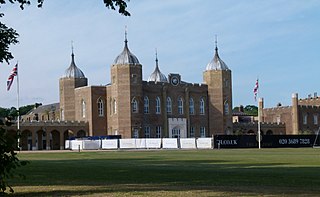
Middle East Command, later Middle East Land Forces, was a British Army Command established prior to the Second World War in Egypt. Its primary role was to command British land forces and co-ordinate with the relevant naval and air commands to defend British interests in the Middle East and eastern Mediterranean region.

General Sir Frederick Alfred Pile, 2nd Baronet, was a senior British Army officer who served in both World Wars. In the Second World War he was General Officer Commanding Anti-Aircraft Command, one of the elements that protected Britain from aerial attack.

Air Chief Marshal Sir William Geoffrey Hanson Salmond,, commonly known as Sir Geoffrey Salmond, was a senior commander in the Royal Flying Corps during the First World War. Remaining in the Royal Air Force after the war, he held senior appointments in the Middle East, Great Britain and India. In 1933 Salmond served as Chief of the Air Staff for only a matter of days before being taken ill and subsequently dying from cancer.

General Sir John Grenfell Maxwell, was a British Army officer and colonial governor. He served in the Mahdist War in the Sudan, the Second Boer War, and in the First World War, but he is best known for ordering the execution of the leaders of the 1916 Easter Rising in Ireland. He retired in 1922.

Lieutenant General Sir William George Holmes KBE CB DSO and Bar was a senior British Army officer who fought with distinction in the First World War. He later served in the Second World War, where he commanded the 42nd Infantry Division during the Battle of France in May/June 1940.

General Sir Robert Gordon-Finlayson was Adjutant-General to the Forces.

General Sir George Watkin Eben James Erskine was a senior British Army officer who is most notable for having commanded the 7th Armoured Division from 1943 to 1944 during World War II.

General Sir Henry Charles Loyd,, nicknamed "Budget Loyd", was a senior British Army officer who fought in both the world wars, most notably during the Second World War as General Officer Commanding (GOC) of the 2nd Infantry Division during the Battle of France in May 1940.

General Sir John Theodosius Burnett-Stuart, (1875–1958) was a British Army general in the 1920s and 1930s.

General Sir Henry Macleod Leslie Rundle, was a British Army general during the First World War.

General Sir Robert Dundas Whigham, was a British Army officer and a former Adjutant-General to the Forces.
Lieutenant General Sir Bertie Drew Fisher, KCB, CMG, DSO was a British Army General during World War II.
Lieutenant General Sir Arthur Francis Smith, was a senior British Army officer who served during the Second World War.

General Sir Nicholas Patrick Carter, is a Kenyan-born senior British Army officer. He served as commanding officer of 2nd Battalion, Royal Green Jackets in which role he was deployed to Bosnia in 1998 and Kosovo in 1999. After service in Afghanistan, he took command of 20th Armoured Brigade in 2004 and commanded British forces in Basra. He was subsequently appointed General Officer Commanding 6th Division, which was deployed to Afghanistan with Carter as Commander ISAF Regional Command South, before he became Director-General Land Warfare. After that he became Deputy Commander Land Forces in which role he was the main architect of the Army 2020 concept. After a tour as Deputy Commander, International Security Assistance Force, he assumed the position of Commander Land Forces in November 2013. In September 2014, he became head of the British Army as Chief of the General Staff succeeding General Sir Peter Wall. In June 2018 he succeeded Air Chief Marshal Sir Stuart Peach as Chief of the Defence Staff.

General Sir George de Symons Barrow, was a British Indian Army officer who became General Officer Commanding Yeomanry Mounted Division and the 4th Cavalry Division.
Major-General Douglas Fitzgerald McConnel was a senior British Army officer who served as General Officer Commanding (GOC) British Troops in Palestine and Trans-Jordan.

Lieutenant General Robert Graham William Hawkins Stone CB, DSO, MC was a senior British Army officer who became General Officer Commanding (GOC) British Troops in Egypt.
Major General John Yeldham Whitfield CB, DSO & Bar, OBE was a senior British Army officer who commanded the 56th (London) Infantry Division during the Italian Campaign of the Second World War and later the 50th (Northumbrian) Infantry Division.

Major-General Sir Arthur Reginald Hoskins, was a senior British Army officer of the First World War.


















